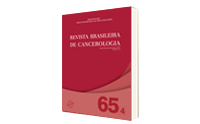Evaluation of the Nutritional Risk of Oncological Patients Attended in the Outpatient of Unacon at a Reference Hospital Through ASG-PPP
DOI:
https://doi.org/10.32635/2176-9745.RBC.2019v65n4.267Keywords:
Nutrition Assessment, Neoplasms/drug therapyAbstract
Introduction: Cancer is a chronic multicausal disease characterized by disordered, rapid and invasive growth of cells altering their genetic material. It is associated with several changes in the gastrointestinal tract and may lead the patient to malnutrition and cachexia. Objective: To evaluate the nutritional risk using the Patient-Generated Subjective Global Assessment (ASG-PPP) of cancer patients undergoing chemotherapy. Method: A cross-sectional, analytical study was conducted comparing chemotherapy treatments attended at the outpatient clinic with data collected from ASG-PPP. Results: Of the 78 patients analyzed, the majority were females (68.82%) aged between 54 + 15 years. The prevalent tumors were esophageal, gastric (23.08%) and breast (23.08). Patients with a localized breast tumor (52.38%) had nausea, vomiting and smells provoked sickness. A significant percentage of patients reported that they were eating less than normal (44.83%) males and (32.64%) females. In the nutritional risk analysis, the critical risk was recurrent among the study patients, with the kidney tumor group having the highest participation (100%). There was no significant difference in the assessment of nutritional diagnosis (p<0.05), however, it was found that most patients needed some sort of intervention when the three first categories were gathered. Conclusion: The evaluation and nutritional monitoring in patients can avoid or minimize the effects of the changes resulting from the disease, providing a positive impact on the quality of life of cancer patients.









